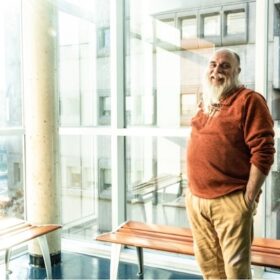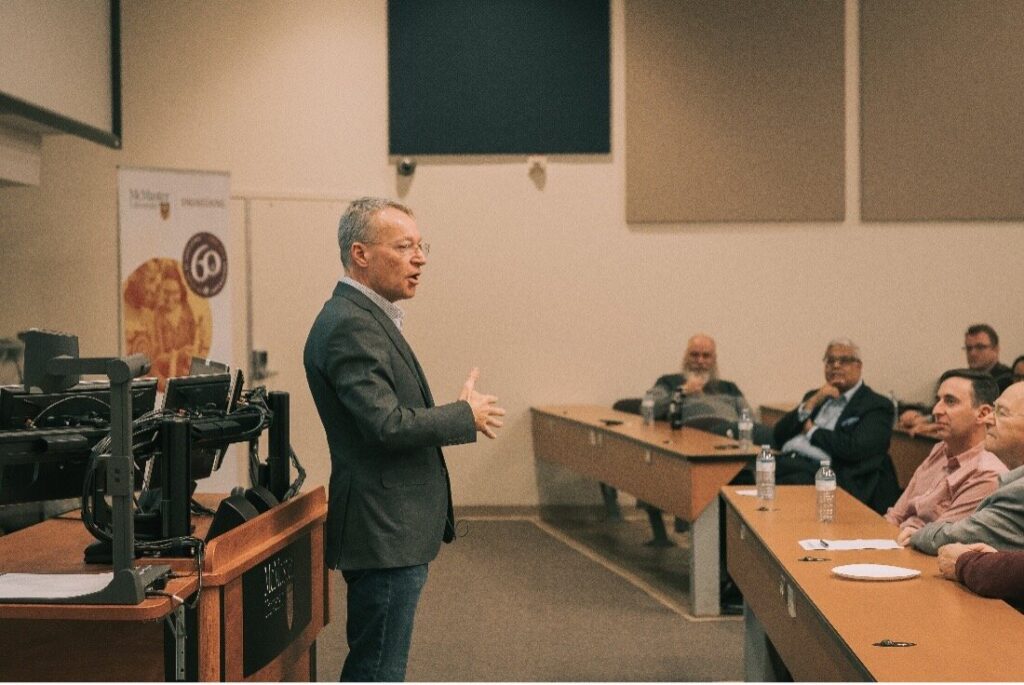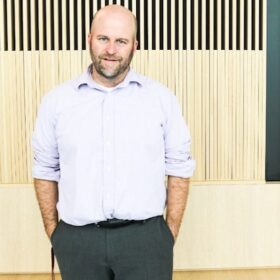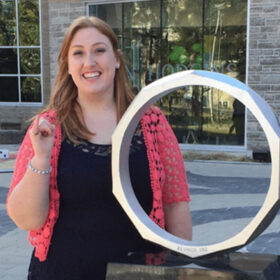
We were able to speak with Glen Crossley, Associate Director of Business Development and Intellectual property, and Innovation Minor instructor here at McMaster University. Glen shares his journey with us from his time working at McMaster and at start-ups in the U.S and Canada. Glen has played an instrumental role in equipping our young innovators with the knowledge they need to pursue their own ideas and build their own businesses or contribute to the success of a start-up.
What led you to your initial career path?
During undergraduate and graduate school, Glen had the opportunity to work with companies like 3M and Xerox and was able to blossom in the role of Research and Development (R&D) in companies he worked with.
3M is a company dedicated to personal protective equipment and products that positively impact the environment. 3M uses science to improve the lives of everyone that encounter their products. (ww.3mcanada.ca)
Xerox is a leader in office and production print technology and expanded into software and services to sustainably power the workforce. Xerox products are designed to make work better for their clients.
Today Xerox scientists and engineers are continuing the legacy of innovation with disruptive technologies in digital transformation, augmented reality, robotic process, automation, additive manufacturing, and clean tech. (https://www.techtarget.com/whatis/definition/Xerox).
We asked Glen how working at larger companies differed from his experience at a start-up.
Glen says, “I started working at some large companies such as 3M and Xerox during my undergraduate and graduate school. These companies at the time had big Canadian research hubs, but you would be working on a small project within a company with hundreds if not thousands of products. Each of those products has a team of people dedicated to its success.
At a start-up, you can wear many hats as an employee. It is much more rewarding because you can make a larger impact within the company vs a multifaceted employee organization,” says Glen.
Where did you start your career as a chemical engineer?
“I started my career at E Ink! They are the originators, pioneers, and commercial leaders in ePaper technology. It is a company that delivers advanced display products to the world’s most influential brands and manufacturers that include the Amazon Kindle, Sony, Kobo E books, Motorola Samsung phones, and BMW’s latest concept car (whose surface changes colour).
They enable the brands they work with to install extremely durable; low-power displays in previously impossible or unimaginable applications and environments. (www.eink.com/about-us.html) E Ink started as a start-up from the Media Lab at MIT.”

“The Media Lab at MIT was the first time I worked in this environment! The Media Lab allows entrepreneurs to create transformative technologies, experiences, and systems that enable people to reimagine and redesign their lives. They engage people everywhere in meaningful, creative experiences integrating art, science, design, and engineering. They work with organizations and communities to transform people’s dreams and ideas into reality through excellence in education, research, innovation, and inspiring creativity – and I am grateful for the time spent with them that led me to my journey with E Ink,” says Glen.
What led you to start a career at McMaster?
Currently, Glen’s position at McMaster is to review the research conducted by the Faculty of Engineering, Science, and Health Sciences programs for commercial potential.
Prior to his role at McMaster, Glen, like so many other people, found it hard to find a job here at a start-up in Canada after returning from the United States (U.S.) He saw most of his friends who worked with him move on quickly to other start-ups within the U.S. while he struggled to find opportunities in Canada. With some determination, Glen eventually found a position at a start-up.
After five years of working at starts ups in Canada, he looked to McMaster to see what commercialization and university research were about.
What led him to McMaster was one question, “why are there so many fewer start-ups in Canada in comparison to the U.S.?”
“When I started working at McMaster, there were a lot of activities happening on campus to get people interested in entrepreneurship workshops. The workshops were formally named Spectrum and later renamed The Forge on Campus,” explains Glen.
“At that time, we focused on outreach to students, faculty, and undergraduates running workshops to get people interested in innovation. So, after a few years of continuing with these workshops on campus, they pivoted to offering innovation-based courses to everyone at McMaster, “says Glen.
In collaboration with The Forge, the Faculty of Engineering, and the DeGroote School of Business, McMaster created the Innovation Minor.
Glen explains, “We had all these courses they had to deliver and get people in as instructors with entrepreneurial experience to help teach students. I agreed to teach the Lean Start-Up and Sprint Methodologies the first time it was offered to the students, and I have been teaching the course ever since.”
“I thought teaching in the Innovation Minor would be a fun way to encourage students to explore entrepreneurship and share what I have learned from watching others take that journey,” says Glen.
Glen said, “It has been a very fulfilling experience to connect with the students in a meaningful way and introduce them to the world of innovation through the Innovation Minor and show them how innovation strategies and design can be applied and used in all disciplines.”
Tell us about an experience you have had in the engineering field you remember fondly. It could be an opportunity where you were able to learn something new or a positive experience that changed your perspective about your work.
Glen says, “There is a notion out there that people from Ivy League schools like MIT, Harvard, or Stanford are more intelligent than McMaster students or alumni or any other Canadian University, and it is simply not the case.”
“Working for a start-up in the U.S. – three of my colleagues, including myself, from Canadian universities were put in leadership roles quickly compared to our U.S. colleagues. It was very eye-opening that you do not have to be from Silicon Valley or an Ivy League school to have an impact at a start-up,” says Glen.
“In the early days at McMaster University, many people would not think, ‘hey, I want to start a business’ but now we have people who have started their own companies well before graduating, and they make it work,” he said.
Why do you think your students genuinely enjoy your course?
“I think people like the material I teach is concise and we have discussions on the topics I am teaching,” he says.
“Discussion in class is interactive; I think one of the other reasons people like the course is because I do not come at it with this professor-student hierarchy. All I can do is share methodologies that have worked for other start-ups and businesses,” says Glen.
“I do not know if you have a clever idea or not, but if you do the homework and tell us whether you think it is a promising idea, we can ask questions and have discussions around how to improve it going forward,” says Glen
“People like working on experiences rather than just doing a case study from what I have found, they want the ability to work on an idea of their own that they are passionate about,” explains Glen.
What is one of your favourite moments instructing here at McMaster?
“The guest lecture by Stephen Elop several years ago was inspiring. I have seen a lot of talks on innovation, and he was one of the absolute best,” says Glen.
Glen says, “His story was a compelling lecture because he knew when to pivot in his roles when he realized competitors were catching up.”

Glen says, “For example, during his lecture, he spoke about his experience working at Microsoft as a head of the Business Division. He told the story of how he had to go into his boss’s office and explain they might have to give away a version of Microsoft Office for free, which was its most profitable division at the time, and his boss lost his mind.”
“The reason for this was if they did not pivot to this strategy, then Google would take away a good portion of their users due to Google docs, sheets etc. They eventually offered a stripped-down version of it and defended their position in the market, but Stephen impacted that decision significantly,” explains Glen.
“It was one of the best entrepreneurship stories I have heard, and it is fun. He is a McMaster graduate, and he is honest and genuine about his experiences working at Microsoft and Nokia,” says Glen.
What is your favourite part of instructing your courses?
“I was extremely excited about the Innovation Minor. It is exhilarating to be involved in offering students the opportunity to explore an idea. Not everyone spends 20 hours a week working on a start-up outside of engineering or other undergraduate degrees because it is a big commitment,” explains Glen.
“Being involved in project-based work, evaluating an idea in 12 weeks, and receiving credit for it gets you one step closer to being a better entrepreneur,” says Glen.
Even though the likelihood of that idea becoming your business is small, the courses gives you the necessary skills to evaluate an idea, go through the process in an organized manner and figure out if your idea can become a reality,” explains Glen.
“It’s fun when students conduct the customer discovery phase of their projects; they will learn something they were not expecting by talking to people,” says Glen.
“The first time I taught the Lean Start-Up, I had a group that wanted to create an event-based app that would help connect people to other students who did not have people to go to the event with,” explains Glen.
“It seems like a reasonable idea, and then when they went through the customer discovery phase, they found out that no one wanted to connect with people they did not know to go to an event with because it seemed too much like a date. As soon as they revised their solution to incorporate more group activities and not just one other individual, more people were open to this idea,” says Glen.
What are some key takeaways you want your students to walk away with once they’ve completed your courses?
“The most rewarding thing you can do as an instructor is impacting your students to think about the world and its possibilities in a unique way. My biggest frustration with people in the entrepreneurship space is seeing people spend too much time on an idea when they could be spending time on their next idea,” explained Glen.
“Key takeaways students should take from the courses I teach are to evaluate their ideas quickly and not be afraid to take risks and try something outside of their comfort zone, especially early in their careers,” says Glen.
“My last and single most important piece of advice is that I want students to know if they do not have strong customer validation on the problem and solution in three to four months, they should be changing direction and start brainstorming their next idea,” says Glen.
When you are not working, what are you doing?
“I have six kids and aging parents that keep me busy, and I enjoy playing tennis, badminton, biking, canoeing, camping, and gardening (because I am getting old), but most of all I love the time I get to spend with my family,” says Glen.
Why do you think students should be incorporating the innovation minor into their degree?
“The Innovation Minor allows you to look at your future from a unique perspective. It can give you a sense of what you might do and explore entrepreneurship in a low-risk environment,” Glen explained.
References:
3M. About page. https://www.3mcanada.ca/3M/en_CA/company-ca/about-3m/
E Ink. About page. https://www.eink.com/about-us.html
Tech Target. Home page. https://www.techtarget.com/whatis/definition/Xerox


